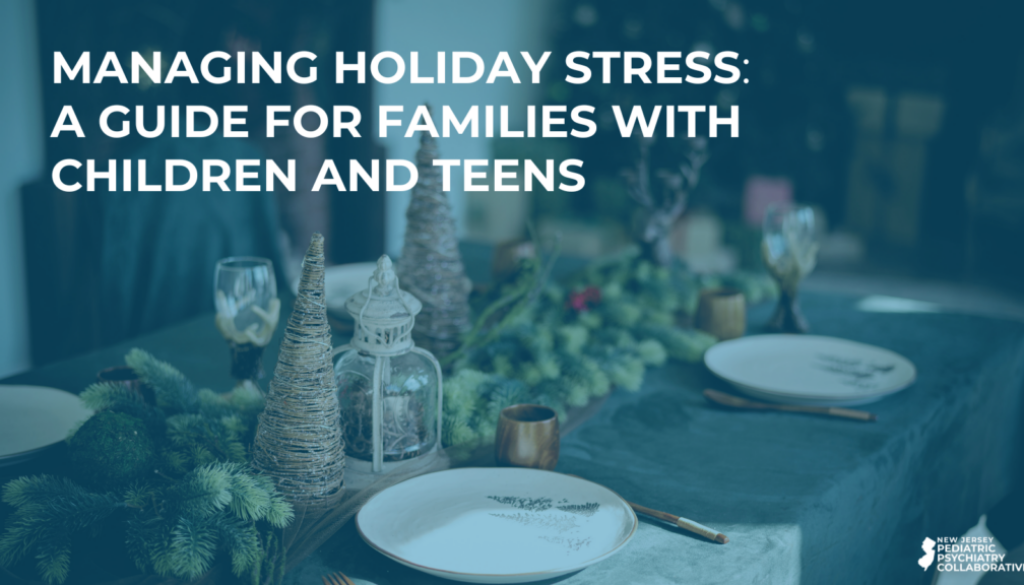Managing Holiday Stress: A Guide for Families with Children and Teens
By Debra E. Koss, MD
The holidays can be a wonderful time of year filled with joy and celebration. It’s a season for gathering with family and friends. It’s a time when religious and cultural traditions are shared. But the holidays can also be a stressful time of year filled with expectations and disappointments. Holiday stress can be caused by many factors. The pressures of shopping and managing bills can affect the holiday spirit of giving. Extended visits with family and friends can put a strain on relationships. Children may be sensitive at this time of year to changes brought about by separation, divorce, military deployments, or the death of a loved one. Children with special needs, such as autism, ADHD, or anxiety, may be especially vulnerable to the disruptions to routine associated with holiday activities. Here are some strategies that may help you and your family manage holiday stress.
Set reasonable expectations for you and your family. Manage your time by creating a schedule that considers the needs and wishes of your immediate family. Say “no” to activities and events that leave your family feeling over-scheduled. Foster open lines of communication with family and friends, discussing reasonable plans for travel, accommodations, and start and end times for activities. Make plans considering breaks needed for meals, naps, and bedtimes. Chances are others are also considering these same issues and will be grateful that you started the conversation.
Discuss holiday plans and let children join in decision-making as much as possible. Invite your children to express their opinions about activities and traditions. Ask each child to select one favorite activity and have them help plan that event. Include children in age-appropriate activities. It may work best for all involved to leave a young child with a sitter when sharing an activity with your teen.
Traditions are an important part of the holiday season. Maintain your focus on the true meaning of the holiday for your family. Continue traditions that hold meaning for your family and be open to discovering new traditions. This may be especially important for blended families. Also, respect the differences that you witness in your neighborhoods and school. The holidays are filled with opportunities to explore and appreciate diversity.
Manage gift expectations. Holidays are a time associated with gift-giving. This can be fun, but it can also cause significant financial stress. Start conversations about gift-giving traditions in advance of the holidays. Focus on the importance of the gesture and not the size or the cost of the gift. Consider homemade gifts or shared group experiences. Help teens to set a reasonable budget for gift-giving with friends. This can be an opportunity to discuss tips for creating and living within a budget year-round.
Maintain a healthy lifestyle. This is essential for our physical and mental health. Make sure everyone in your family is eating a healthy diet and getting enough sleep. Consider age-appropriate needs for each child within your family. Maintain exercise routines and spend time outdoors. Time spent walking in a park is a great shared activity for family members of all ages and may serve as a break from bright lights and loud sounds associated with some holiday celebrations.
This is a wonderful time of year to experience the joy of giving. Involve your children in community activities designed to help those in need. Even young children can participate in creating holiday cards or baking holiday treats. Through these types of activities, children gain a stronger sense of community, empathy, and generosity.
Consider the losses your family has experienced. The holidays are a time when feelings of loss may be experienced more intensely. Loss may be triggered by different types of experiences, including divorce, a move, military deployment, or the death of a loved one. Remember that everyone experiences grief on their own timeline. Some family members may want to continue a tradition to honor a loved one while others may want to avoid any formal celebration. Be respectful and flexible when organizing holiday activities following a loss.
Reach out and ask for help. Even with thoughtful planning, children and teens may become overwhelmed by the holidays. Notice any changes in your child’s mood or behavior at home, in school, or with friends. Some children or teens may become anxious while others may appear sad or withdrawn. Children may have greater difficulty paying attention in class or completing homework. Behavior changes may include tantrums, changes in sleep, or physical aggression. Keep in mind, children with special needs may be more vulnerable to these changes. Talk with your support network before the holiday season starts, including family and friends, teachers and guidance counselors, and pediatricians or mental health providers. Be prepared to modify holiday plans, ask for extra support at school, or ask your medical provider to evaluate for more specific mental health concerns.
Author Profile:


Debra E. Koss, MD
Clinical Assistant Professor, Department of Psychiatry Rutgers-RWJMS
NJPPC Project Manager for the New Jersey Psychiatric Association




